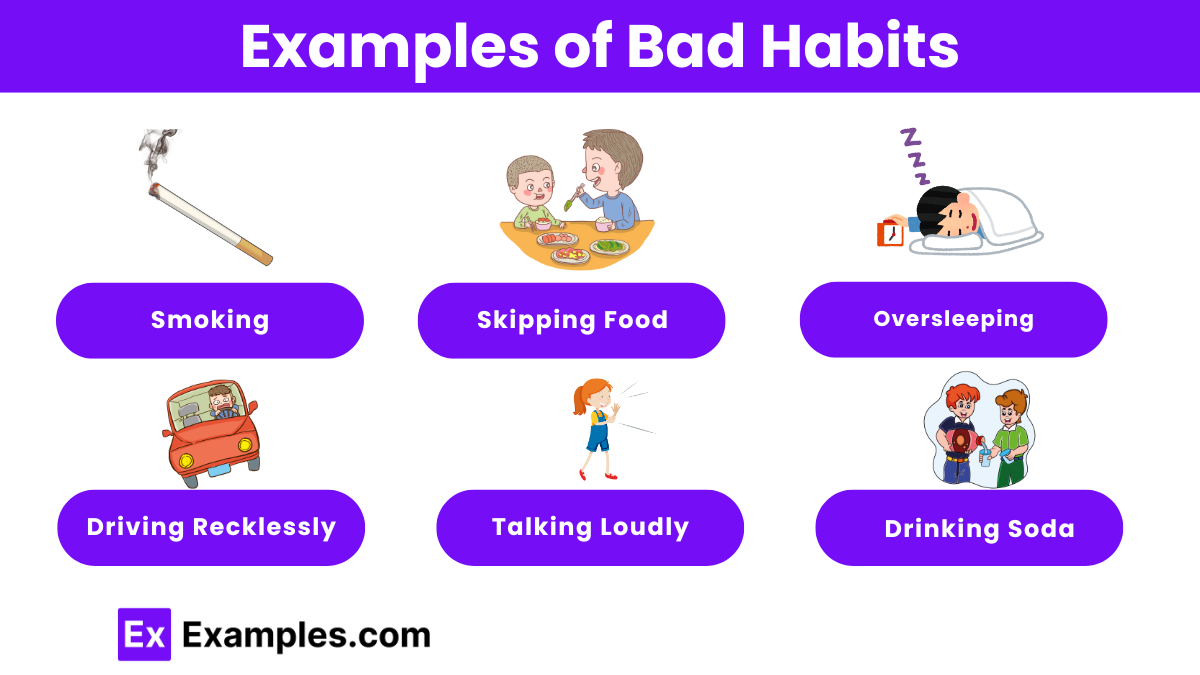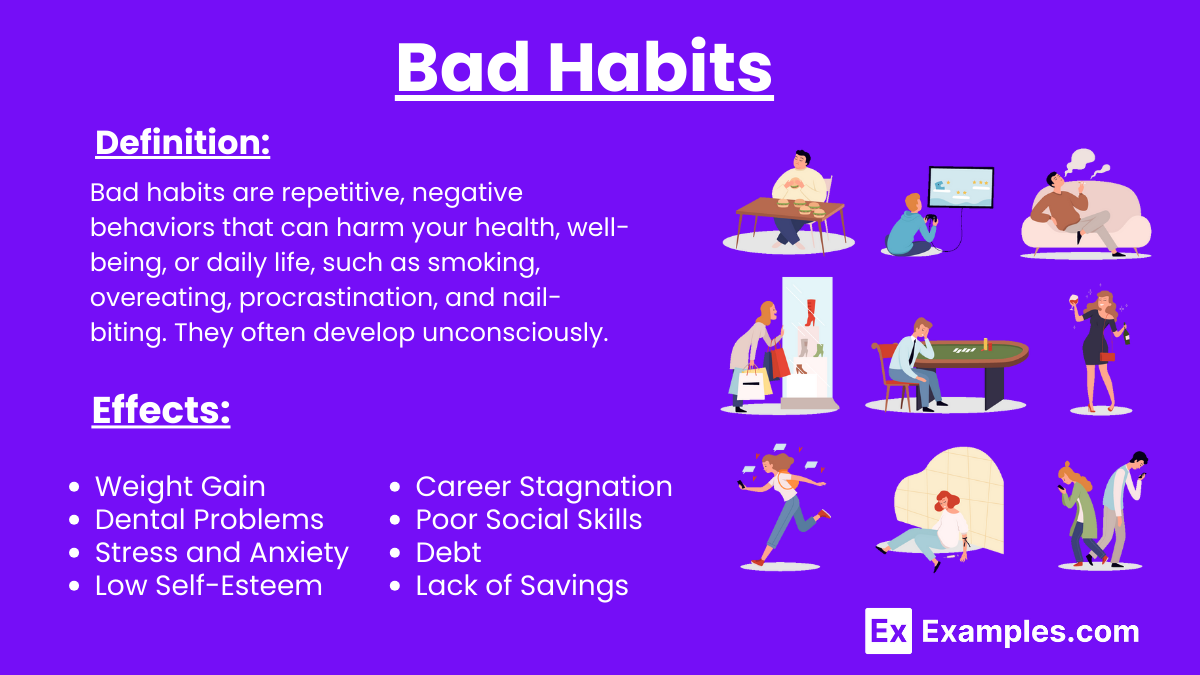90+ Bad Habits Examples
Bad crisis communication can turn a small issue into a major crisis, harming reputations and relationships. About bad communication Quotes show how poor habits affect understanding and connections. For example, George Bernard Shaw said, and Peter Drucker said, Bad habits are repetitive behaviors or actions that have negative consequences on an individual’s health, well-being, or daily life. These behaviors often become ingrained over time, making them difficult to change or eliminate.
What are Bad Habits?
Bad habits are repetitive behaviors or actions that have double negative effects on an individual’s well-being, productivity, or relationships. These habits can be physical, such as smoking and poor diet Questionnaire, or behavioral, such as procrastination and poor time management. In the context of bad communication, bad habits include interrupting others, not listening attentively, and failing to express thoughts clearly.
Examples For Bad Habits

- Not Flossing: Skipping dental flossing.
- Ignoring Deadlines: Not meeting deadlines for tasks.
- Oversleeping: Sleeping more than the necessary amount.
- Driving Recklessly: Operating vehicles unsafely.
- Watching Too Much News: Spending too much time on news media.
- Interrupting Others: Cutting off others while they’re speaking.
- Skipping Exercise: Avoiding physical activity.
- Complaining: Constantly expressing dissatisfaction.
- Talking Loudly: Speaking at a high volume in public.
- Drinking Soda: Consuming sugary carbonated drinks frequently.
Examples of Bad Habits For students
- Procrastination: Delaying assignments and study sessions until the last minute.
- Skipping Classes: Missing scheduled classes without valid reasons.
- Cramming: Studying all night before an exam instead of consistent review.
- Not Taking Notes: Failing to write down important information during lectures.
- Poor Time Management: Not effectively planning or prioritizing tasks.
- Multitasking During Study: Trying to study while distracted by phones or social media.
- Ignoring Feedback: Not paying attention to teacher’s comments on assignments.
- Lack of Sleep: Staying up late, leading to insufficient rest.
- Not Asking Questions: Hesitating to seek clarification on confusing topics.
- Unhealthy Eating Habits: Consuming junk food instead of balanced meals.
Examples of Bad Habits For Adults
- Lack of Exercise : Not exercising regularly can contribute to weight gain, heart disease, and a decline in overall fitness.
- Smoking: Inhaling tobacco, which is harmful to health.
- Overeating: Consuming more food than necessary, often leading to weight gain.
- Overspending: Spending more money than one can afford, leading to financial issues.
- Neglecting Exercise: Avoiding physical activity, which affects overall health.
- Excessive Alcohol Consumption: Drinking alcohol in unhealthy amounts.
- Negative Thinking: Focusing on pessimistic or harmful thoughts.
- Skipping Breakfast: Missing the first meal of the day, leading to poor nutrition.
- Overuse of Technology: Spending too much time on phones, computers, or TV.
- Ignoring Health Symptoms: Neglecting to address potential health issues promptly.
Bad Habits List for Girl
- Overuse of Social Media: Spending excessive time on social platforms.
- Negative Self-Talk: Engaging in self-criticism and negative thoughts.
- Staying Up Late: Going to bed late and not getting enough sleep.
- Gossiping: Talking about others behind their backs.
- Skipping Skincare Routine: Neglecting daily skincare habits.
- Ignoring Deadlines: Not meeting deadlines for tasks and responsibilities.
- Complaining: Constantly expressing dissatisfaction or grievances.
- Slouching: Poor posture while sitting or standing.
- Being Late: Frequently arriving late to appointments or events.
- Cracking Knuckles: Making joints crack noisily.
Examples of Bad Habits in Everyday Life
- Leaving Clothes Unfolded: Letting laundry pile up without folding or putting it away.
- Overuse of Plastic: Using disposable plastic products instead of reusable ones.
- Eating While Watching TV: Consuming meals distractedly, leading to overeating.
- Interrupting Conversations: Cutting off others while they’re speaking.
- Using Phone at the Table: Checking the phone during meals, disrupting social interactions.
- Neglecting Recycling: Failing to separate recyclables from regular trash.
- Driving with Low Fuel: Frequently driving with a near-empty gas tank.
- Leaving Taps Running: Wasting water by not turning off taps completely.
- Skipping Sunscreen: Not applying sunscreen before going outdoors.
- Ignoring Vehicle Maintenance: Neglecting regular car check-ups and oil changes.
Examples of Bad Habits in relationships
- Lack of Communication: Not openly discussing feelings and issues.
- Taking Partner for Granted: Failing to appreciate and acknowledge your partner.
- Being Overly Critical: Frequently pointing out flaws and mistakes.
- Jealousy: Being excessively jealous and insecure.
- Lack of Empathy: Not understanding or caring about your partner’s feelings.
- Avoiding Conflict: Not addressing issues and allowing resentment to build.
- Dishonesty: Hiding the truth or lying to your partner.
- Neglecting Quality Time: Not spending enough meaningful time together.
- Overdependence: Relying too heavily on your partner for emotional support.
- Ignoring Boundaries: Disregarding your partner’s personal space and boundaries.
Examples of Bad Habits for kids
- Thumb Sucking: Continuously sucking their thumb for comfort.
- Not Sharing: Refusing to share toys or food with others.
- Throwing Tantrums: Having frequent emotional outbursts when upset.
- Interrupting Adults: Speaking out of turn or interrupting conversations.
- Ignoring Homework: Avoiding or delaying school assignments.
- Skipping Bedtime: Not following a consistent sleep schedule.
- Refusing to Eat Vegetables: Avoiding healthy foods in favor of sweets or snacks.
- Hitting or Biting: Using physical actions to express frustration.
- Ignoring Chores: Avoiding household responsibilities assigned to them.
- Watching Too Much TV: Spending excessive time in front of the television.
Examples of Bad Habits in the Bible
- Lying: Ananias and Sapphira lied about their donation (Acts 5:1-10).
- Greed: Judas Iscariot’s betrayal of Jesus for 30 pieces of silver (Matthew 26:14-16).
- Jealousy: Cain’s jealousy of Abel leading to murder (Genesis 4:1-8).
- Pride: King Nebuchadnezzar’s pride before his downfall (Daniel 4:28-37).
- Laziness: The sluggard who refuses to work and faces poverty (Proverbs 6:9-11).
- Gossip: Spreading rumors and causing discord among brothers (Proverbs 16:28).
- Drunkenness: Noah’s intoxication and its consequences (Genesis 9:20-21).
- Disobedience: King Saul’s disobedience to God’s commands (1 Samuel 15:22-23).
- Idolatry: Israelites worshiping the golden calf (Exodus 32:1-6).
- Coveting: King Ahab coveting Naboth’s vineyard (1 Kings 21:1-16).
List of Bad Habits for Characters
- Overconfidence: Believing they are always right and never doubting their abilities.
- Manipulation: Using deceit to control others for personal gain.
- Impatience: Frequently rushing decisions without thinking them through.
- Ingratitude: Failing to show appreciation for help or kindness.
- Arrogance: Displaying a sense of superiority over others.
- Neglecting Promises: Making commitments and then failing to keep them.
- Excessive Sarcasm: Using sarcasm to the point of offending others.
- Obsessive Behavior: Fixating on a single goal to the detriment of everything else.
- Recklessness: Taking unnecessary risks without considering the consequences.
- Secretiveness: Keeping secrets that should be shared, leading to mistrust.
6 Steps to Changing Habits
- Identify the Habit: Recognize the specific habit you want to change. Understanding the habit and its triggers is the first step toward transformation.
- Set Clear Goals: Define what you want to achieve by changing this habit. Make your goals specific, measurable, and attainable.
- Develop a Plan: Create a detailed plan that outlines the steps you will take to change the habit. Include strategies for dealing with triggers and setbacks.
- Replace the Habit: Find a healthier or more positive behavior to replace the old habit. This substitution can help you avoid reverting to the undesirable behavior.
- Monitor Progress: Keep track of your progress and hold yourself accountable. Regularly review your goals and adjust your plan as needed.
- Stay Consistent: Practice the new behavior consistently until it becomes a natural part of your routine. Persistence and patience are key to making lasting changes.
Effects OF Bad Habits
- Weight Gain: Overeating and lack of exercise can lead to obesity.
- Dental Problems: Poor oral hygiene, like not brushing teeth regularly, can cause cavities and gum disease.
- Stress and Anxiety: Procrastination and poor time management can increase stress levels.
- Low Self-Esteem: Negative self-talk and constant self-criticism can erode confidence.
- Decreased Productivity: Procrastination and poor time management can lead to missed deadlines and reduced efficiency.
- Career Stagnation: Lack of commitment and negative thinking can hinder professional growth.
- Isolation: Bad habits like gossiping and negativity can alienate friends and family.
- Poor Social Skills: Excessive screen time can hinder the development of effective communication skills.
- Debt: Overspending and poor financial management can lead to debt and financial stress.
- Lack of Savings: Neglecting to save money can result in financial insecurity.
How to Break Bad Habits and Change Behaviors
- Recognize the Habit: Acknowledge the specific habit you want to change. This could be smoking, overeating, procrastination, or any other undesirable behavior.
- Analyze Triggers: Determine what triggers the bad habit. It could be stress, boredom, social situations, or specific times of the day.
- Define Your Objectives: Set specific, measurable, achievable, relevant, and time-bound (SMART) goals. For example, “I want to stop smoking within the next three months.”
- Develop a Strategy: Outline a step-by-step plan to break the habit. This might include reducing the frequency of the habit gradually or replacing it with a positive behavior.
- Find Alternatives: Substitute the bad habit with a healthier behavior. For instance, replace smoking with chewing gum or taking a walk.
- Reward Yourself: Celebrate your successes, no matter how small. Rewards can be simple, like treating yourself to a favorite activity or enjoying a small treat.
- Involve Others: Share your goals with friends, family, or support groups. Having someone to encourage you can make a significant difference.
- Monitor Changes: Keep a journal or use an app to track your progress. This helps you stay accountable and motivated.
- Allow Time: Understand that breaking a habit takes time. Be patient with yourself and don’t get discouraged by setbacks.
Why is it important to break bad habits?
Breaking bad habits is essential because they can negatively impact your physical and mental health, productivity, and relationships. Eliminating these habits can lead to a healthier, more fulfilling life.
How do I identify a bad habit?
To identify a bad habit, observe your daily routines and behaviors. Pay attention to actions that negatively affect your health, happiness, or productivity.
How can I set effective goals to break a bad habit?
Set SMART goals: Specific, Measurable, Achievable, Relevant, and Time-bound. For example, “I want to reduce my smoking from 10 cigarettes a day to 5 within the next month.”
How long does it take to break a bad habit?
The time it takes to break a habit varies for each person and habit. On average, it can take anywhere from 21 days to several months of consistent effort to replace a bad habit with a good one.
Can professional help assist in breaking bad habits?
Yes, seeking professional help from a therapist, counselor, or support group can provide valuable guidance, strategies, and encouragement to break bad habits.
Can mindfulness help in breaking bad habits?
Yes, mindfulness helps increase self-awareness and control over impulses, making it easier to recognize and change negative behavior patterns.
How does stress influence bad habits?
Stress can trigger bad habits as a coping mechanism. Managing stress through healthy activities can reduce reliance on these habits.
What role does environment play in breaking habits?
Changing your environment can remove triggers and cues associated with the bad habit, making it easier to adopt new behaviors.
How can exercise help in breaking bad habits?
Exercise can reduce stress, improve mood, and provide a healthy alternative to harmful habits, aiding in the habit-breaking process.
What are the benefits of breaking bad habits?
Breaking bad habits leads to improved health, increased productivity, better relationships, and overall enhanced well-being.



